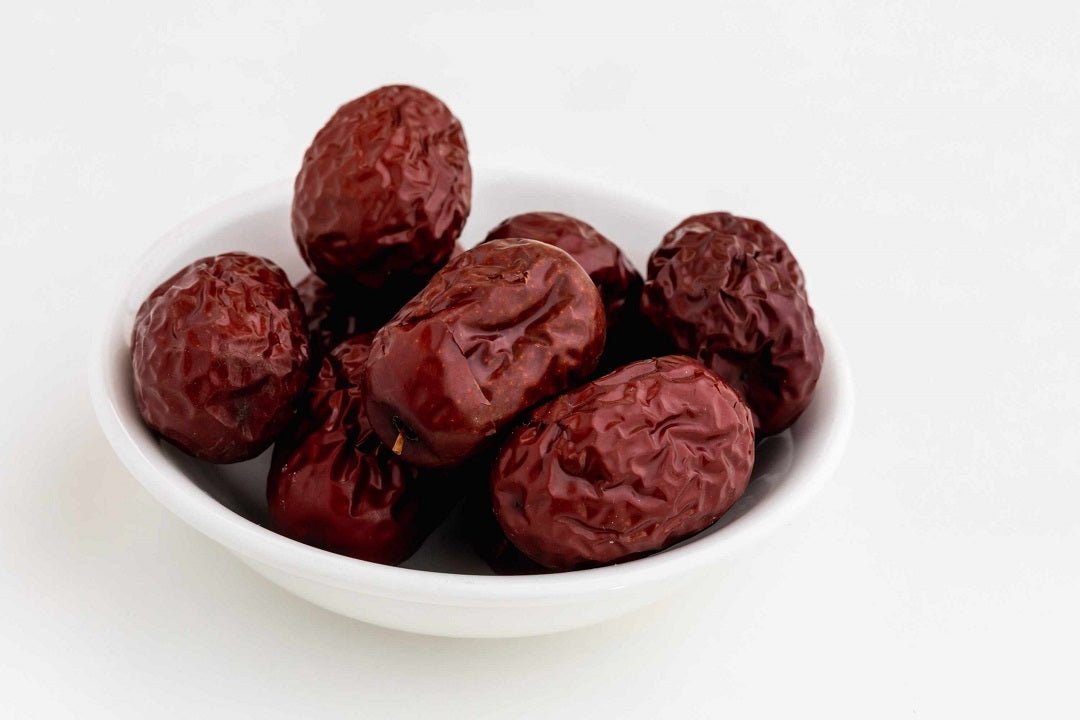Your cart is empty
Free shipping on all US orders


Free shipping on all orders

Ziziphus Summary
Here's one for you we don’t believe you’ve ever encountered- Ziziphus. While the name sounds like some exotic creature from a Dr. Seuss’ story, it isn’t that unfamiliar throughout many parts of Asia.
In fact, evidence of this fruit’s cultivation date back to over 9000 years in Asian texts, where it is affectionately known as Jujube. In the western world, it is more commonly known as red or Chinese dates and is oftentimes used as an additive in foods.
We aren’t that concerned with its usage in enhancing the flavor of foods, but rather any applications it may possess in elevating your health or performance.
Ziziphus is a fairly balanced fruit, containing the essentials in vitamins A, C, and E, along with B1, B2, and B3. Mineral-wise, it contains magnesium, zinc, and potassium to support healthy electrolyte balance. It also has a decent amount of beta-carotene, the pro-vitamin of Vitamin A, and arguably superior form.
Jujube fruit also possesses a range of flavonoids, triterpenoids, alkaloids, and fatty acids that bolster health. Most of their effects revolve around reducing inflammation, oxidation, cancer, and cardiovascular risk factors.

While there are many potential benefits of Ziziphus fruit consumption, one important thing to keep in mind is that most have been not definitively confirmed by studies. They may have potential, and as long as you err on the side of safety, should not be an issue if consumed.
Its most noteworthy benefits include:
Blood sugar management is not just important for diabetics. In fact, if you are an elite athlete, improving blood glucose management can have a noteworthy benefit on your performance. Ziziphus can help improve the usage of blood glucose, which can lead to reduced storage in adipose tissue.
It is important to mention that there are several species of Ziziphus, and not all of them possess the same effect on blood glucose.
One of the most promising effects of jujube fruit consumption relates to its ability to improve your cholesterol profile. In particular, it can simultaneously lower triglycerides and LDL when taken over the course of 12 weeks, according to a study published in the Journal of Phytotherapy Research in 2017.
In turn, it may contribute to a reduction in heart disease risk by decreasing atherosclerotic plaque formation that can lead to heart attacks or strokes.

Jujube can technically be classified as an adaptogen, at least when combined with other better-known ones. One study published in the Journal Explore observed the fact that a combination of jujube with astragalus and angelica root over the course of 4 weeks was able to reduce feelings of chronic fatigue and insomnia as self-quantified by study participants.
35 out of 40 study participants reported significant feelings of improvement, showing its potential solo use for the purpose of improving sleep quality.
The heart is arguably the most important organ in the human body (or secondary, only to the brain). One of the major accompaniments to aging is an increased rate of cell death (apoptosis) to cardiac muscle, leading to reduced workout capacity and increased morbidity.
A combination of aerobic exercise combined with Ziziphus juice ameliorated the rate of cardiac muscle apoptosis, even though the study was conducted on rats that had previously experienced a myocardial infarction (heart attack).
Many of the changes that occur following a heart attack are similar to that of a human's experience, which effectively means that you can possibly maintain a “younger heart”.
There hasn’t been a large body of research done on jujube with regards to its potential application for athletes, but one that shows promise is on running performance in endurance trained athletes.
Compared to placebo, administration of Ziziphus led to an improvement in the time to exhaustion (TTE), to an extent considered significant. Small increases in oxidative capacity were also observed, which could contribute to better ATP production during a race.
Of course, this finding will need more research done, but it won’t hurt if you wish to try it yourself.

There isn’t a clearly established dosage for Ziziphus agreed upon as yet. Traditional use typically entailed adding about 50 fruits to hot water and making an extract. Also, many of the unofficial dosage guidelines rely on rodent dosages extrapolated to human data.
For instance, a 200lb person would require in excess of 7000mg if this model holds true, which is significant for an unproven supplement.
Ziziphus may potentially interact with several classes of medications, including:
Apart from the aforementioned warnings when using certain classes of medications, there is the possibility that Ziziphus might reduce fertility in women (even if only transiently). This is noteworthy if trying to conceive.
Research on Ziziphus is a work in progress. As more becomes available we will update this post to reflect that accordingly.
DreamZzz is an all-natural, non-habit-forming sleep aid containing Ziziphus designed to help anyone wind down from their day.
Clinically validated ingredients, such as GABA, help to induce a night of deep and restful sleep by directly stalling the body’s natural “wake up!” mechanisms. Apigenin, from Chamomile, and Hops compliment GABA by enhancing binding to the sleep receptors in the brain, assisting in the maintenance of a normal circadian rhythm, and reducing anxiety. L-theanine is a unique amino acid known to promote relaxation and take the edge off of stimulants, like caffeine, that is used earlier in the day to get you going while 5-HTP and melatonin work along the serotonin pathway to enhance sedation.
DreamZzz is the ultimate nutritional supplement to get you to sleep fast, improve nightly recuperation, and get you ready for the next day.
References: